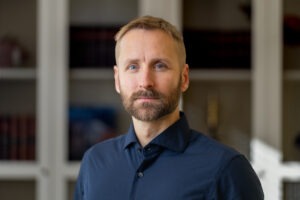This article is part of a series featuring Q&As with Ralph O’Connor Sustainable Energy Institute (ROSEI)-affiliated researchers. Next up is Ján Drgoňa, an associate professor in the Department of Civil and Systems Engineering and a core ROSEI faculty member. He joined Hopkins on January 1 from the Pacific Northwest National Lab (PNNL), where he was a senior research data scientist.

Ján Drgoňa
How did you first get involved with or learn about sustainability?
I grew up on a farm in Slovakia, so nature was all around me very early in my life. But my true connection in terms of academic work didn’t happen until I was pursuing my undergraduate degree. I had the opportunity to work on a project that worked on energy-efficient building controls, and I found it so interesting that I kept working on the topic for over a decade. I just picked it up as a student research project, not imagining it would become a career, but I am very happy that it has.
Why are you passionate about sustainability/renewable energy?
Energy is the most important aspect of modern society. From running a washing machine to starting a car, you need energy to do anything. Providing sustainable and cheap sources of energy for as many people as possible doesn’t just improve the life and health of individuals; It also contributes to peace and happiness in the world. There are so many different topics that you can pursue as a researcher, but I have found it extremely rewarding to work in a space that has the potential to help so many people, as well as our planet.
How does your commitment to sustainability play out in your everyday life?
I am pretty minimalist; I don’t own or need a lot of stuff. I reuse the things that I have and only replace them when they are no longer functional.
On a personal level, I love spending time in nature whenever I can. I like hiking and climbing mountains to keep a connection to nature alive and not just mediated through a screen. Spending some time in the wilderness is a very humbling experience. It helps remind me that nature is very complex. There are a lot of things about it that we as humans do not understand and can’t control, and that is OK.
Tell us about your research, and what aspects currently or in the future tie into sustainable energy efforts?
I work on energy efficient control of buildings. This involves mathematical modeling of heat transfers in buildings in a way that can be used for real-time decision making. We are finding ways to make accurate predictions for how heat flows through the building, but at the same time, not being so computationally expansive that our methods can’t be used in practice. It’s a tradeoff between very accurate modeling and very simple models that are currently being deployed.
This approach is both data-driven and physics-based. This is exciting because we are combining relatively large machine learning models with parsimonious physical lows. How to efficiently integrate them in a coherent algorithmic and software framework is something I am very excited about.
Is there an article, book or podcast that people can check out to help better understand the area you work in or your specific work?
There are a couple of articles that can help you learn a little more about what AI can do to make buildings more energy efficient. One is about my work that was published by PNNL while I worked there, and there is another one from New Scientist. Both articles explain the benefits in terms of improved indoor comfort and energy efficiency as well as implementation challenges that come with advanced building controls.
What advice or suggestions do you have for students who want to pursue careers in sustainable energy?
It’s important to set goals, I always do that when there is something that I want to achieve. The goals don’t need to be too detailed, but they should provide you with direction.
Also, building fundamental skills is essential. Say a student wants to work on making buildings more energy efficient. Rather than to immediately jump to the currently most popular scientific paper, I would suggest focusing on fundamentals in all relevant engineering skills to build strong foundations on top of which you can build your career.
Lastly, be patient. Small steps at a time are better than jumping big leaps forward. Fast pace in a short period can lead to burnout. I am a fan of learning over longer periods of time and integrating everything you know together so you can make an impact down the road.
Why did you choose to join the Hopkins sustainable energy community?
I already knew a lot of people at Hopkins and quite a few that were involved with ROSEI. I followed and admired the work being done here. It was exciting to get an offer from Hopkins and ROSEI because I believe it is one of the places to be if you want to pursue high impact research in sustainable energy systems. It was a no-brainer for me. Hopkins and ROSEI have colleagues with a wide variety of expertise, and the institute is also growing, so the future looks bright. I wanted to be a part of it.
